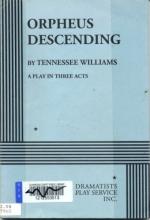|
This section contains 1,708 words (approx. 5 pages at 400 words per page) |

|
Aubrey holds a Ph.D. in English and has published many articles on twentieth-century literature. In this essay, Aubrey discusses the play in terms of the Orpheus and Eurydice myth.
The legend of Orpheus and Eurydice has fascinated poets, playwrights, and composers from the Renaissance to the modern era. Since a central element of the myth is the power of music, it has not surprisingly been the subject of numerous operas, including a version of Williams's Orpheus Descending, with libretto by J. D. McClatchy and music by Bruce Saylor (1994). Plays such as Eurydice by French dramatist Jean Anouilh, and Orpheus by Jean Cocteau (1926; made into a film by Cocteau in 1950), and films such as Marcel Camus's Black Orpheus (1959) are testament to the enduring nature of the myth.
The Orpheus story was not, however, part of Williams's original concept of the play, which initially emerged as Battle of...
|
This section contains 1,708 words (approx. 5 pages at 400 words per page) |

|




